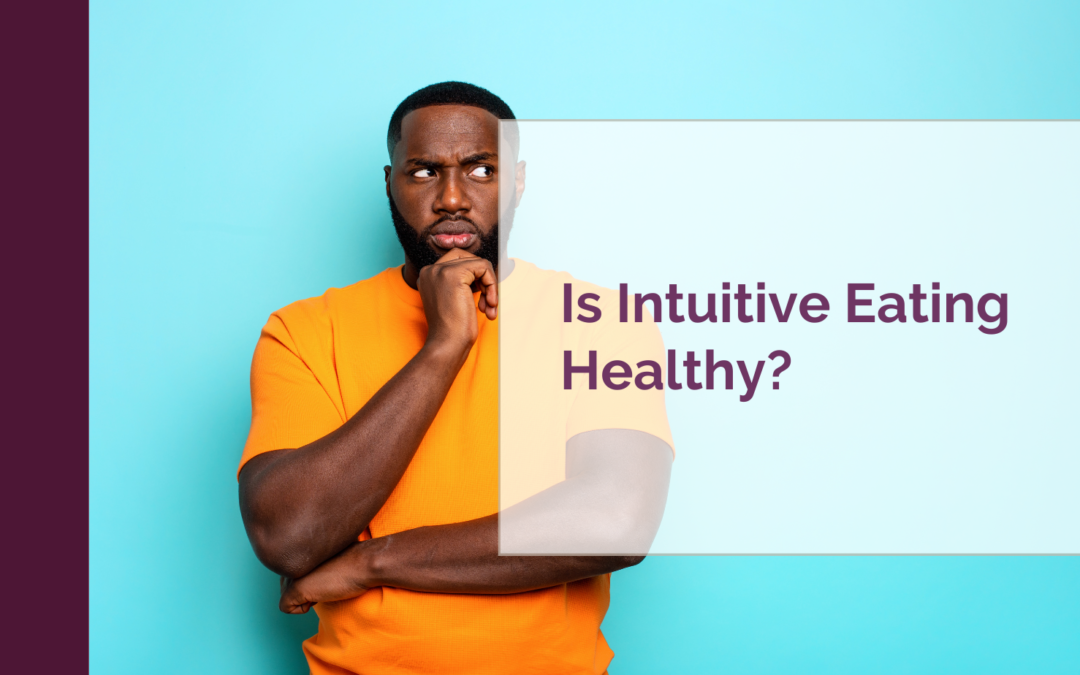Intuitive eating has been gaining traction as an alternative to traditional diets and weight-loss programs. But is intuitive eating healthy?
Despite its popularity, many people still need clarification about what intuitive eating is and whether it’s healthy. There is a common misconception that intuitive eating disregards the health and encourages people to eat whatever they want, whenever they want. In reality, intuitive eating prioritizes physical, emotional, and mental health over weight loss and encourages a non-judgmental approach to food. In this blog post, we’ll explore the question is intuitive eating healthy? or not.
Let’s start by exploring what intuitive eating is.
At its core, intuitive eating focuses on listening to your body and using its signals as a guide for how much to eat, move, and rest. Unlike traditional diets that restrict certain foods or limit portion sizes, intuitive eating emphasizes a non-judgmental approach to food. It encourages people to eat in a way that feels satisfying and nourishing. This way of eating also rejects the idea that weight loss is the key to better health, recognizing that health and weight are not the same things. Instead, intuitive eating prioritizes improving physical, mental, and social health, regardless of a person’s size or weight. It’s about learning to respect your body at its natural weight and understanding that health can look different for everyone.
Why do people feel that intuitive eating ignores health?
While intuitive eating promotes a healthy relationship between food and the body, some people feel that it ignores health altogether. Often this is because intuitive eating emphasizes the importance of pleasure and satisfaction in eating and encourages people to enjoy all foods without judgment.
For some, this may mean consuming more foods that are traditionally considered unhealthy or processed, which can be perceived as contradictory to health-focused eating. This concern is rooted in the belief that certain foods are inherently “good” or “bad” and that indulging in “bad” foods will lead to adverse health outcomes. However, this view oversimplifies the relationship between food and health. Plus ignores the complex interplay between individual preferences, privilege, cultural influences, and social contexts.
Additionally, some feel that intuitive eating does not provide clear guidelines or structure for specific health conditions or concerns. Consequently, some people may believe intuitive eating is ineffective for their health needs.
However, intuitive eating can help individuals with chronic illnesses by reducing stress and anxiety around food, promoting nutrient-dense foods, and encouraging joyful movement. Individuals can improve their overall health and well-being, regardless of their chronic illness, by developing a more attuned and intuitive approach to eating and movement.
But dieting, cutting carbs, and weight loss have been recommended to me by my health care provider.
Healthcare providers may advise people to lose weight for health because they are often trained in a medical model that prioritizes weight as a risk factor for chronic illnesses. However, this approach can harm someone’s health as it perpetuates weight stigma and encourages disordered eating behaviors. Also, this can lead to negative psychological outcomes such as depression, anxiety, and poor body image.
Weight stigma has negative effects on health that we cannot ignore. Discrimination and stereotypes surrounding body size and weight can perpetuate the pitfalls of dieting and restrictive eating patterns, leading to chronic inflammation, heart disease, diabetes, and even mortality. Additionally, weight stigma has been linked to mental health issues such as depression, anxiety, low self-esteem, and disordered eating behaviors. However, intuitive eating can help eliminate the impact of weight stigma by promoting body acceptance and rejecting the idea that weight is the only indicator of health. By prioritizing self-care and listening to the body’s signals, individuals can break free from the harmful effects of weight stigma and improve their overall health and well-being.
Weight is not a reliable indicator of health.
There is a growing body of research suggesting that weight is not a reliable indicator of health and that focusing on weight loss is ineffective in the long-term. Instead, a weight-neutral approach that focuses on improving health behaviors, such as intuitive eating and joyful movement, and prioritizing overall well-being, may be more beneficial for individuals’ health and long-term success.
Many people falsely believe that food restriction for weight loss is a surefire way to improve their health, but there is no long-term scientific evidence to support this claim. Diet culture messages encouraging intentional weight loss by promoting cutting out entire food groups, limiting eating windows, avoiding certain foods, and restricting calories can have negative health consequences. Intentional weight loss through dieting is associated with harmful outcomes, such as disordered eating, a self-destructive pattern of thinking, and weight cycling. Plus, it perpetuates a societal preference for smaller bodies over larger ones.
Oftentimes, people who focus solely on losing weight end up engaging in unhealthy behaviors, such as restrictive eating or over-exercising, which can actually harm their health in the long run. According to research, dieting is a well-established predictor of weight gain and contributes to the development of an unhealthy relationship with food.
The Pitfalls of Undereating and restrictive eating patterns
Sustaining long-term food restriction and deprivation is challenging, as individuals often develop intense symptoms that result in rebound eating and overconsumption to compensate for the prolonged restriction. As a result, individuals end up regaining the weight they lost and sometimes even more. It’s crucial to note that this is not due to personal weakness or wrongdoing but rather a normal biological response. This cyclical pattern of repeatedly losing and gaining weight is commonly known as weight cycling or yo-yo dieting. It places considerable stress on the body, potentially leading to chronic illness.
Therefore, focusing on overall health and well-being is crucial, rather than solely on the number on the scale.
How does intuitive eating lead to improved health outcomes?
It should be clear by now that intuitive eating does not neglect the importance of health. Instead, it leads to improved health outcomes.
Here are just some of the ways that intuitive eating places health at the forefront of our relationship with food.
- It breaks the cycle of dieting and promotes a healthy relationship with food.
- Fosters body awareness and a non-judgmental attitude towards food.
- Prioritizes health and well-being over weight loss.
- It encourages listening to the body’s signals of hunger and fullness.
- Helps establish a positive relationship between food and the body.
- Linked to decreased disordered eating rates and improved psychological well-being.
- Results in physical improvements to health, such as lowered LDL cholesterol levels and reduced blood pressure.
- Encourages a diverse and balanced intake of nutrients to support health and well-being.
- Promotes enjoyment of food without guilt or shame.
- Improves social connections, spontaneity, and a greater sense of autonomy.
- Reduces binge eating and other harmful eating behaviors.
- Increases satisfaction and enjoyment of food.
- Helps individuals become more in tune with their body’s needs and unmet needs.
- Reduces anxiety and stress related to food and eating.
- Improves digestion and reduces digestive issues.
- Helps individuals feel more energized and alert throughout the day.
- Promotes better sleep and overall sleep quality.
- Helps individuals develop a more positive and accepting attitude toward their bodies.
- Emphasizes experiencing the positive effects of joyful movement on the body.
To sum up, intuitive eating prioritizes health in our relationship with food rather than ignoring it. Intuitive eating encourages individuals to prioritize physical, mental, and social health, regardless of size or weight and promotes a non-judgmental approach to food. It helps individuals break free from the cycle of dieting and develop a healthy relationship with food, promoting satisfaction and balance with eating. Through intuitive eating, individuals can establish a positive relationship with food and their bodies, ultimately improving their overall health and well-being. It is a sustainable alternative to restrictive diets and deprivation, fostering body awareness and a non-judgmental attitude toward food.
Sources:
Bacon, L., & Aphramor, L. (2011). Weight science: Evaluating the evidence for a paradigm shift. Nutrition Journal, 10(1), 9. https://doi.org/10.1186/1475-2891-10-9
Tylka, T. L., Annunziato, R. A., Burgard, D., Daníelsdóttir, S., Shuman, E., Davis, C., & Calogero, R. M. (2015). The weight-inclusive versus weight-normative approach to health: Evaluating the evidence for prioritizing well-being over weight loss. Journal of Obesity, 2015. https://www.ncbi.nlm.nih.gov/pmc/articles/PMC4132299/
Tylka TL, Wood-Barcalow NL. The Body Appreciation Scale-2: item refinement and psychometric evaluation. Body Image. 2015 Jan;12:53-67. doi: 10.1016/j.bodyim.2014.09.006. Epub 2014 Oct 21. PMID: 25462882. https://pubmed.ncbi.nlm.nih.gov/25462882/
*Written by Katie Kroeker, RD
Take steps towards a healthier and happier you book an appointment with an intuitive eating registered dietitian.
Explore the benefits of intuitive eating and transform your eating habits, mental wellness, and overall well-being. Don’t wait any longer to improve your health and cultivate a positive relationship with food.
Book an appointment with A Registered Dietitian
PIN ME FOR LATER







